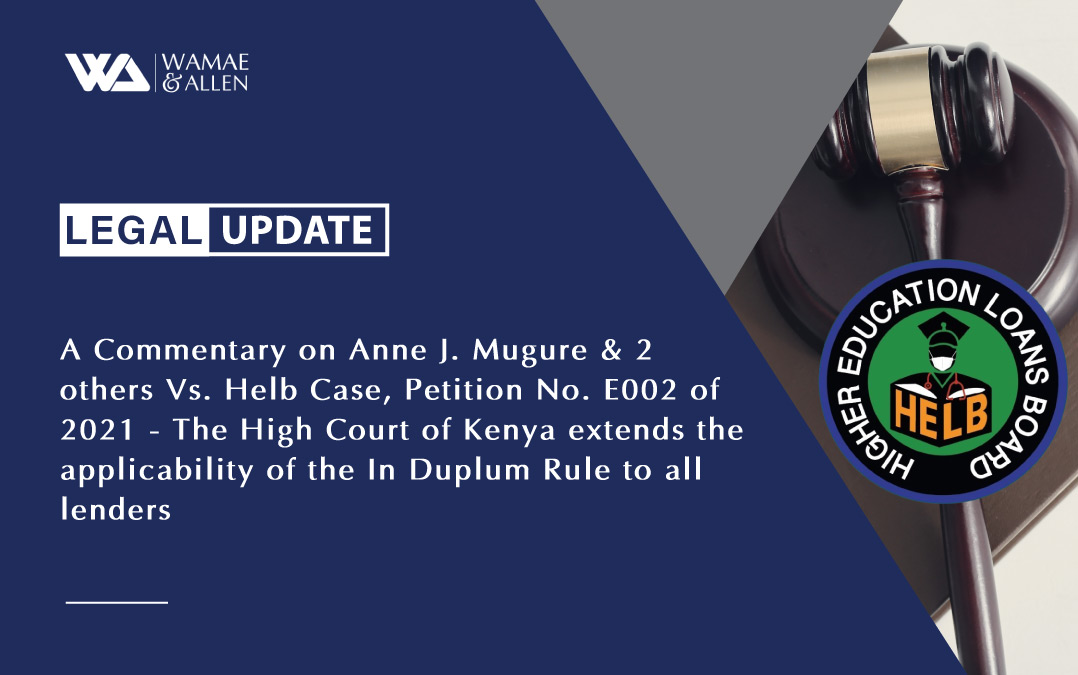 Loading...
Loading...
“From the foregoing, the Court of Appeal was alive to the fact that the rule was concerned with public interest. In my view, the rule was introduced in our Laws to tame the appetite of Lenders who had made recovery of interest on advances a cash cow. Simply put, the Legislature was expressing its displeasure with lenders who left amounts of advances to go over the roof due to interest before pouncing on the hapless borrowers. Mabeya J, in Anne J. Mugure & 2 Others v Higher Education Loans Board, Nairobi High Court Commercial and Tax Division Constitutional Petition No. E002 OF 2021
Introduction
Creditors love defaulting borrowers; they are the best source of profits. A borrower takes a KES 21 million loan which having failed to service, balloons to the sum of KES 103 million by the time the creditor initiates recovery. However, in respect of banks, effective 1st May 2007, the in duplum rule through Section 44A of the Banking Act protected borrowers from exorbitant interest accumulations on loan facilities. Simply put, the in duplum rule limits the amount recoverable by a bank on a defaulted facility to the principal owing when the loan became non-performing plus contractual interest not exceeding the principal owing when the loan becomes non-performing plus recovery expenses i.e., Principal + Interest + Expenses = 2*Principal + Expenses.
Of all the battles fought in court over injunctions, the common weapon in the arsenal of the legal protagonists has been an attack on the applicable interest to be paid pursuant to the contract between the lender and the borrower governing a contractual document. The Court of Appeal captured the essence of disputes over interest application in the case of Pius Kimaiyo Langat v Co-operative Bank of Kenya Limited [2017] eKLR in the following words:
“There is a perennial vexing nightmare for borrowers who take a relatively small loan from a lending institution, but a few years down the line, the institution drops a bombshell of a demand for the immediate payment of a colossal sum, literally bankrupting the borrower, if not confining him/her to a hospital bed due to depression. The main bones of contention are invariably: uncertainty of lending terms and documentation, fluctuating rates of interest, penalty interest, default charges, interest on arrears, additional interest, commissions, bank charges, bank statements or lack of them, among others which may or may not have been part of the written contract.”
To respond to the interest rate challenges, in 2006, the most fundamental game changer introduced to the banking industry was the in duplum principle. Section 44 A of the Banking Act was amended and brought about in duplum. The essence of the in duplum rule, as expressed in the case of Mwambeja Ranching Company Limited & Another v Kenya National Capital Corporation [2019] eKLR, is that the in duplum rule is a rule of law which provides that when interest on a debt equates to the capital of the debt, interest ceases to continue accruing.
In Desires Derive Ltd v. Britam Life Assurance Co. (K) Ltd (2016) eKLR, it was held that the in duplum rule only applied to banks or financial institutions under the Banking Act and excluded Microfinance Institutions, Co-operative Societies, Saccos and other lenders, by virtue of section 54 of the Banking Act.
This article will discuss the applicability of the in duplum rule to other lenders apart from banking institutions under the Banking Act.
Facts of the Anne J. Mugure & 2 Others Vs. HELB Case
The thrust of the petitioner’s case was that on diverse dates, they borrowed loans from the respondent to facilitate their undergraduate studies. That the respondent (HELB) had been charging exorbitant interest and penalties which often grew beyond double the principal amounts owed thereby making repayment difficult. For instance, the 1st petitioner, a youth living with disability had borrowed Kshs. 82,980/= in July 2004 at an interest rate of 2%. As of July, 2016, the debt had accumulated to Kshs. 540,464/10.
According to the petitioners, the debts had doubled the principal amounts in breach of section 44A of the Banking Act, the in duplum rule. The particulars of the violation of rights were the interest rates and penalties were exorbitant and contravened the HELB beneficiaries’ socioeconomic rights and Consumer rights under article 46 of the Constitution. Therefore, the petitioners sought a declaration of constitutional invalidity of Section 15(2) of the Higher Education Loans Board Act to the extent that it violated the in-duplum Rule.
The Respondent on the other hand opposed the petition on grounds that the respondent had already undertaken measures to cap the accruing interest on the petitioner’s accounts and to loanees accounts at HELB to the outstanding principal loan. The Respondent also opposed the petition on grounds that Section 44A of the Banking Act did not apply to it since as the repayment of HELB loans was not only contractual provision but also a statutory provision governed by its founding statute.
The Ratio Decidendi
First, the judge made a finding that the current consensus was that the in duplum rule only applied to banks and financial institutions under the Banking Act, a position set out in the case of Desires Derive Ltd v. Britam Life Assurance Co. (K) Ltd (2016) eKLR.
Secondly, the judge highlighted the rationale for the in duplum rule, as expressed by the Court of Appeal in Mwambeja Ranching Company Limited & another v Kenya National Capital Corporation [2019] eKLR, was to advance public interest in the financial sector by protecting borrowers from exploitation by lenders who permit interest to accumulate to astronomical figures. Additionally, the rule was also designed to safeguard the equity of redemption and safeguard against banks making it impossible to redeem a charged property.
Thirdly, the judge held that since the in duplum rule was designed to further public interest and to protect the borrower from exploitation, the statutory aim should apply to all lenders and not just banking institutions, if the intention of parliament is to be affected. This led the judge to finding that in view of the public interest, the in duplum rule will be applicable for all those lending monies as it does to banks.
The judge then applied the above principle to the case at hand and held that it would be unfair to have the loan continue attracting interest plus penalties ad infinitum. More importantly, the judge found that Section 44A is discriminatory since it protects only those who borrow from banks as opposed to borrowers from other institutions such as microfinance institutions and shylocks.
In conclusion, the court declared section 15(2) of the Higher Education Loans Board Act is unconstitutional to the extent that it leads to interest rates and fines becoming more than the principal amount advanced
Implications Of the Judgment and Concluding Reflections
The judgement is a timely judicial intervention to protect consumers from lenders. This is because a considerable number of Kenyans borrowing from other lenders apart from banks, such as shylocks, digital lenders and microfinance institutions operate with wanton abandon to reap unconscionable maximum returns. According to numerous reports including those of the Central Bank, there is consensus on the rise of Kenya’s new ‘shylock’ economy, as evidenced by the efforts of the Central Bank to regulate digital lenders resulting in the Central Bank of Kenya (Digital Credit Providers) Regulations, 2021.
Comments
Good laws balance public interests with commercial interest equitably to ensure that though the freedom to contract that underpins a capitalist society is respected, it is not at the expense of the populace.
In 2018, Allen Gichuhi SC petitioned Parliament to amend the Consumer Protection Act with a view to having the in duplum rule apply to all money lending transactions. Unfortunately, this did not see the light of day. His proposal was modelled on the South African National Credit Act of 2005.
The decision in Desires Derive Ltd v. Britam Life Assurance Co. (K) Ltd (2016) eKLR is no longer good law as a Micro-finance is not exempted from the provisions of Section 44A of the Banking Act.
The case of Francis Mbaria Wambugu v Jijenge Credit Limited [2020] eKLR, was the case where the loan ballooned from Kshs. 3,700,000 to a staggering KShs.100,000,000 within 7 months of default. Though this was a ruling on an injunction application, the court found that a prima facie case had been established as to whether the in duplum rule should also be applied to microfinance institutions. The court reached this conclusion after evaluating several decisions of the high court and the Court of Appeal that interpreted the in duplum principle as public policy consideration.
The Constitution has by virtue of Article 10(2) (b) elevated equity as a principle of justice to a constitutional principle and requires the courts in exercising judicial authority to protect and promote that principle, as was held in Willy Kimutai Kitilit v Michael Kibet [2018] eKLR.
Courts have become more vigilant in setting aside any bargain which is harsh, unconscionable and oppressive. Equity can intervene to relieve that party of such conditions, according to the principle in Kenya Commercial Finance Company Ltd vs Ngeny & Another [2002] 1KLR.
Several statutes already embody the in duplum rule. For instance, section 38(8) of the Tax Procedures Act 2015, which governs late payment interest upon a taxpayer failing to pay a tax on or before the due date for the payment of the tax, provides that “The accrued late payment interest shall not, in aggregate, exceed the principal tax liability.” Similarly, section 16 of the Rating Act CAP. 267, which governs the imposition of rates on land and buildings in Kenya, provides that upon late payment of the assessed rate by the rating authority, the interest charged shall not exceed the principal amount of the rate owing.
This begs the question: With the above statutes already applying the in duplum principle in addition to the Banking Act, what would justify restricting the applicability of the principle to only banking institutions?
It is imperative that the next Parliament takes urgent action and amends the Consumer Protection Act to encapsulate the in duplum principle in furtherance of the right to consumer protection and in consonance with Articles 10 and 46 of the Constitution.
This article is provided free of charge for information purposes only; it does not constitute legal advice and should be relied on as such. No responsibility for the accuracy and/or correctness of the information and commentary as set in the article should be held without seeking specific legal advice on the subject matter. If you have any query regarding the same, please do not hesitate to contact Litigation vide litigation@wamaeallen.com










